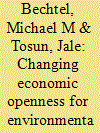|
|
|
Sort Order |
|
|
|
Items / Page
|
|
|
|
|
|
|
| Srl | Item |
| 1 |
ID:
092336


|
|
|
|
|
| Publication |
2009.
|
| Summary/Abstract |
Citizens' concerns about (international) environmental protection standards are of increasing importance to governments in industrially advanced, high-regulating countries. In almost any proposal for a trade agreement, countries with low environmental regulation standards are required to introduce higher policy standards in exchange for high-regulating countries dismantling their trade barriers and granting access to their domestic markets. Low-regulating countries often act as required and introduce legislation aimed at reducing pollution. This leads to declaratory or de jure policy convergence. But such legislative action is not always associated with de facto or actual policy convergence, since policies are not always enforced. To analyze the strategic aspect of this potential "slippage," we set up a game-theoretic model with imperfect information. In the model, a high-regulating and a low-regulating country negotiate a bilateral free trade agreement with environmental provisions. We show how potential gains from trade, policy enforcement, and reputation costs, as well as domestic demands for environmental protection affect the occurrence of environmental policy convergence through conditional trade agreements. This study thereby advances our understanding of the relationship between bilateral trade and convergence of environmental policies.
|
|
|
|
|
|
|
|
|
|
|
|
|
|
|
|
| 2 |
ID:
112921


|
|
|
|
|
| Publication |
2012.
|
| Summary/Abstract |
The accumulation and maintenance of emergency oil stocks in accordance with the requirements of the European Union involve changes in legislation, the strengthening of national stockholding institutions and the attraction of investment. Despite these challenges, almost all Southeastern and Eastern European countries have begun to align their oil stockholding arrangements with the European model, albeit there is variation in the actual degree of convergence. The greatest convergence is observed for Croatia and the Former Yugoslav Republic of Macedonia. In marked contrast, the oil stockholding system of Moldova continues to be different from the European model. This study provides an overview of the Southeastern and Eastern European countries' progress in approximating the European requirements for emergency oil stocks and identifies the factors responsible for the cross-country variation. The differences observed stem from the extent to which the countries are legally obliged to comply with the European provisions, their membership aspirations, levels of energy-related investment from the European Union, and dependence on oil imports.
|
|
|
|
|
|
|
|
|
|
|
|
|
|
|
|
| 3 |
ID:
121749


|
|
|
|
|
| Publication |
2013.
|
| Summary/Abstract |
The European Union has become an important leader in international environmental affairs - particularly through the negotiation of multilateral environmental agreements (MEAs) with favourable terms. In this article, EU environmental leadership is studied from a new perspective, focusing on the ratification stage of environmental regime formation. Specifically, it investigates whether the EU is also capable of motivating third states to join its preferred MEAs. It is argued that third states join the EU's preferred MEAs to signal their compliance with EU environmental standards in an effort to become eligible for various rewards that the EU could potentially offer, including a credible membership perspective, access to its lucrative markets, and aid and assistance. The argument is tested by examining the ratification behaviour of 25 non-EU Member States with regard to all 21 MEAs negotiated under the auspices of the United Nations Economic Commission for Europe (UNECE). The results provide robust support for the theory that EU rewards motivate third states to ratify these treaties. The results withstand a number of statistical tests, even when alternative explanatory factors such as trade intensities, transnational communication and geographic proximity are controlled for. The study is the first large-scale demonstration of the EU's external influence at the ratification stage of environmental regime formation. By identifying three different channels of EU influence, the research permits a more refined understanding of the EU's role as a promoter of environmental protection standards.
|
|
|
|
|
|
|
|
|
|
|
|
|
|
|
|
| 4 |
ID:
110399


|
|
|
|
|
| Publication |
2011.
|
| Summary/Abstract |
The accumulation of appropriate emergency stocks of crude oil and petroleum products has been at the heart of the European Commission's efforts to increase the security of supply. This study investigates how effectively the 'new' Member States comply with the requirements of Council Directive 2006/67/EC, which imposes the obligation to maintain minimum stocks of crude oil and/or petroleum products. The empirical focus of this analysis is not only motivated by the practical relevance of this issue, but also by the fact that eleven of the twelve new Member States were given grace periods between one and seven years to bring their national stockholding arrangements in line with the European requirements. The granting of extended deadlines raises the question whether this instrument indeed facilitates the transposition process. The empirical findings show that except for Latvia, compliance with the EU stockholding requirements is generally very good. A more detailed analysis of the Latvian case highlights that the transposition delays principally stem from budgetary constraints. More generally, the individual new Member States' capacity to cope with the financial burdens and the degree of adjustment pressure determine the variation in oil stock levels.
|
|
|
|
|
|
|
|
|
|
|
|
|
|
|
|
|
|
|
|
|